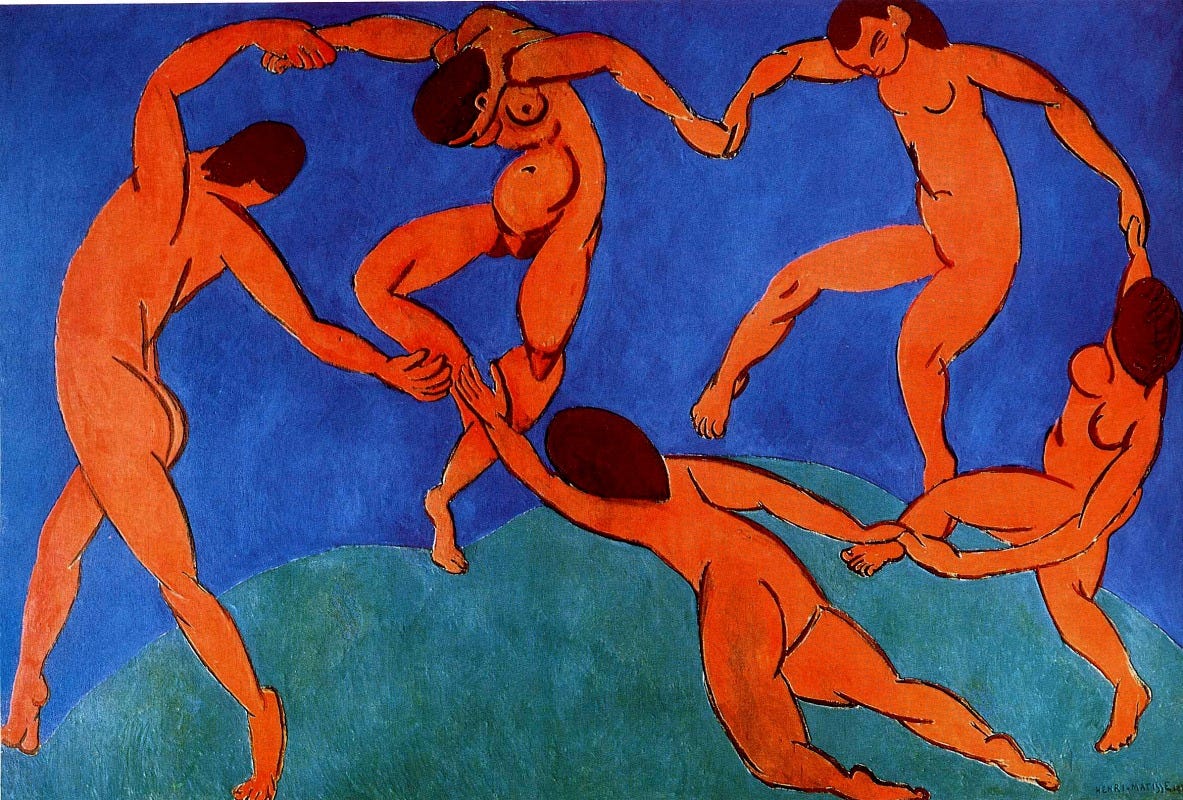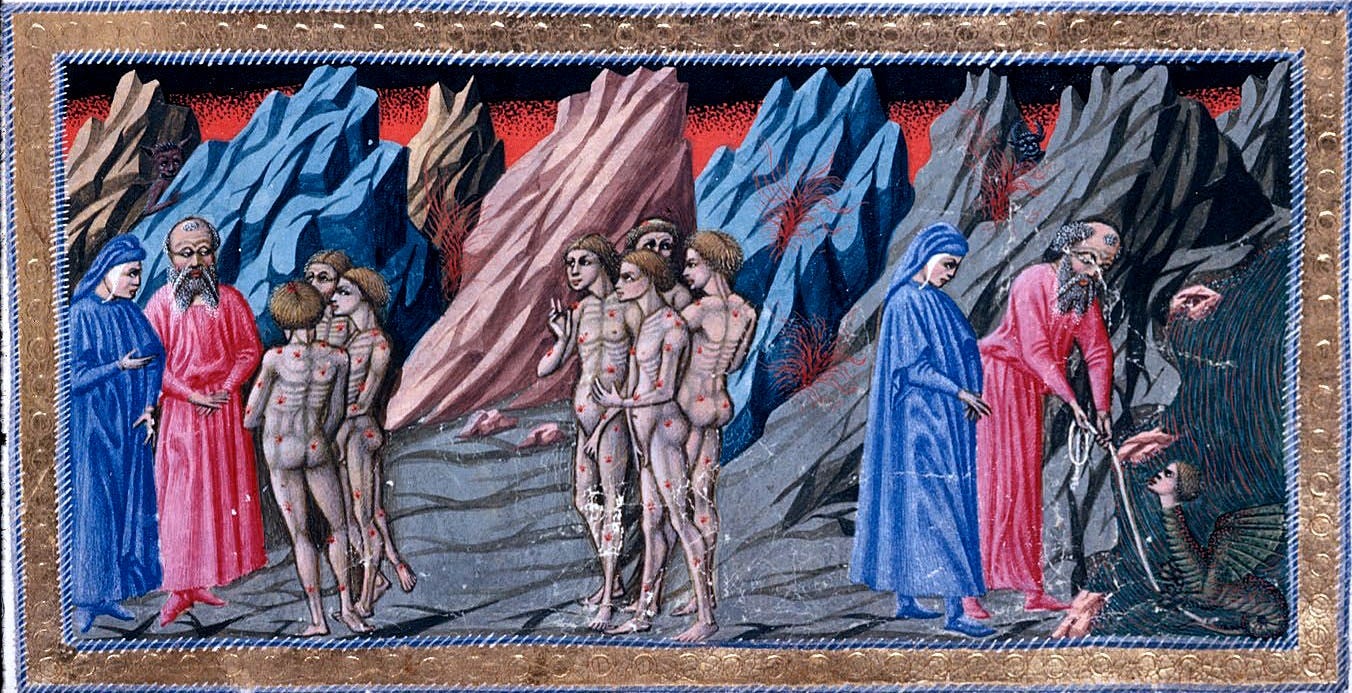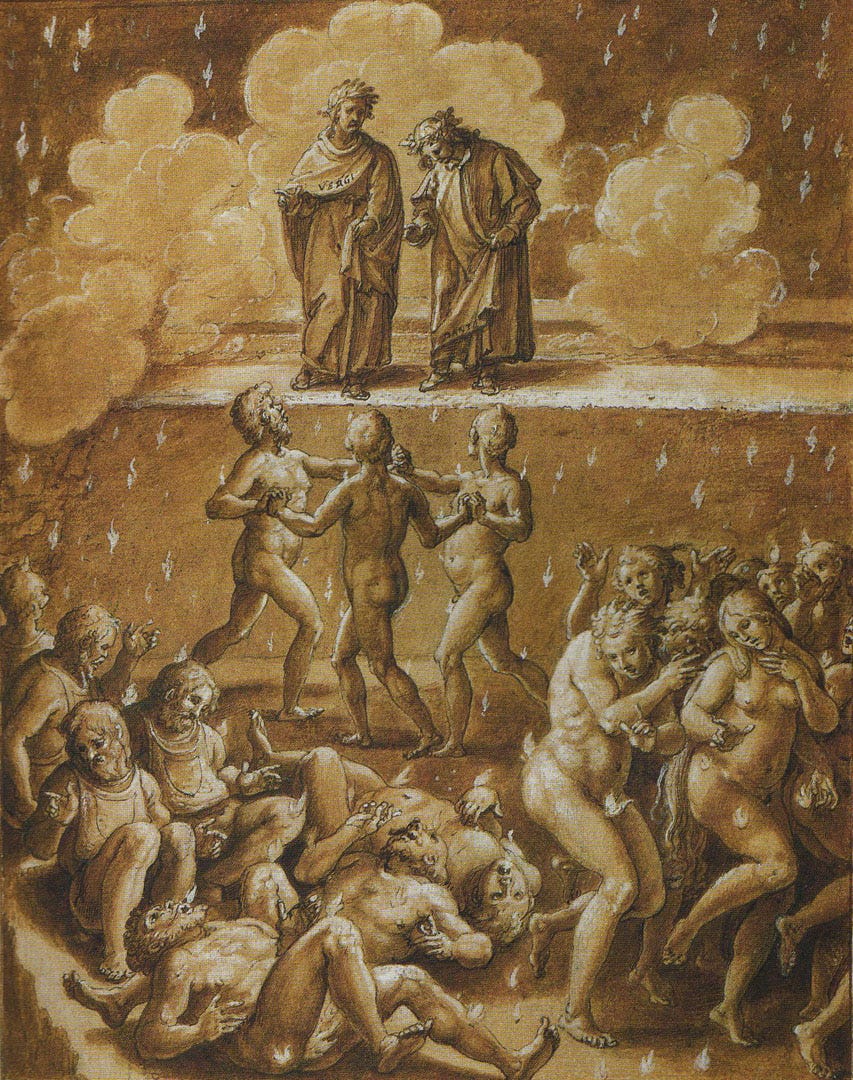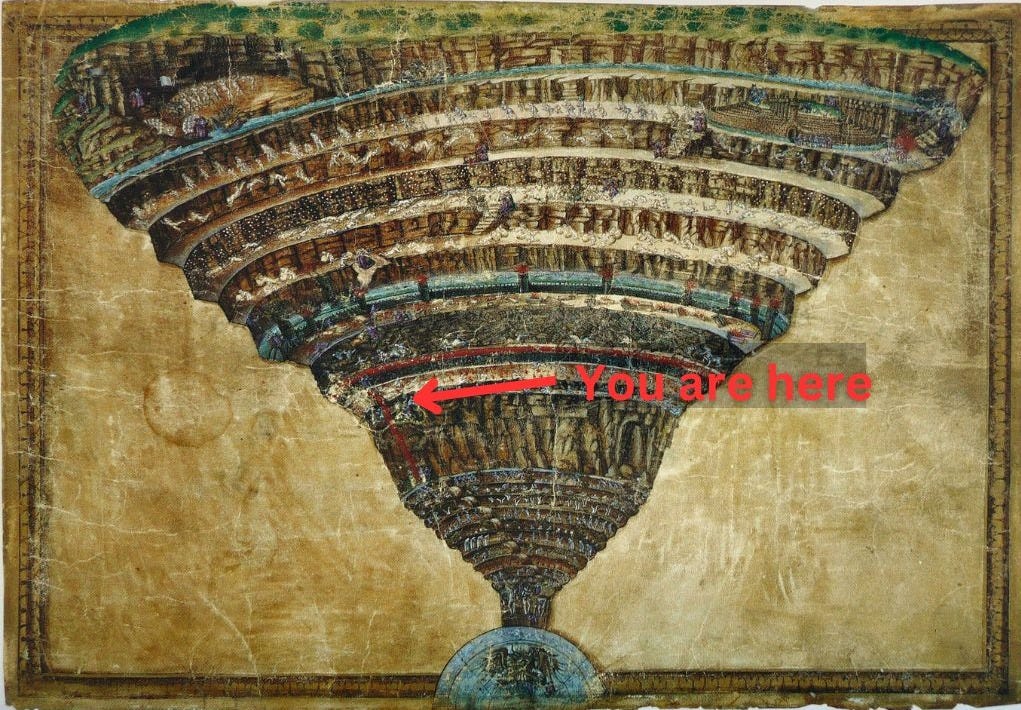The Road to Hell is Paved With Good Intentions
(Inferno, Canto XVI): Florentines Nobles, Cord and the beast
The road to Hell is paved with good intentions.
~ a Russian proverb
Welcome to Dante Read-Along! 🌒
(If this post appears truncated in your inbox you can read it on the web by clicking here. )
Welcome to Dante Book Club, where you and I descend into Hell and Purgatory to be able to ascend to Paradise. Our guide is the great Roman poet Virgil and in this Sixteenth Canto we continue through the burning sands of the third ring of Violence. You can find the main page of the read-along right here, reading schedule here, the list of characters here (coming soon), and the list of chat threads here.
In each post you can find a brief summary of the canto, philosophical exercises that you can draw from it, themes, character, and symbolism explanations.
All the wonderful illustrations are done specially for the Dante Read-Along by the one and only Luana Montebello.
This Week’s Circle ⭕️
Seventh Circle Third Ring Continued - Sound of the Waterfall - Three Noble Florentines in a Wheel - News of the new Florence from Dante - The roaring waterfall of the Phlegethon - Dante’s girdle - Virgil throws it over the edge - A creature raising itself up at Virgil’s summons.
Canto XVI: Summary
As we open, still in the burning sands, Dante hears the waters from the channel of the Phlegethon as they fall over the edge of the Seventh Circle in the distance. From a group of running souls, three individuals emerged, calling out to Dante and recognizing where he was from by his clothing, that of their “indecent country” (XVI.9) Florence.
The dress of the Florentines “was that most beautiful, the most noble, and the most decorous of that of any nation; it was in the manner of the togaed Romans.”1
Their wounds from the punishment of the falling flames and burning sands were terrible, with old and new scars mingling on their bodies, which moved Dante to compassion at their pain.
The three continued their previous lament; since, upon these burning sands, the sinners must keep moving or become rooted in place for 100 years,2 they “formed a wheel, all three of them together” (XVI.21) so that they could continually move while turning their faces toward Dante as they spoke, “so that their necks opposed their feet in one uninterrupted flow” (XVI.26-27).
One of them speaks, and asks Dante to explain how he came to be there; if he is hesitant to stop and speak to them due to the environment, perhaps he would consider their fame as a worthy reason, despite their baked countenances and the burning sands. All three are Florentine Guelphs who represent a “more virtuous civic leadership”3 in the generation before Dante.
The soul who is speaking notes another in his wheel, and tells Dante that even though “he now must wheel about both peeled and naked, / was higher in degree than you believe” (XVI.35-36); this is Guido Guerra, the grandson of Gualdrada,4 and whose “sword and his good sense accomplished much” (XVI.39).
The next soul in the wheel that the speaker points out is Tegghiaio Aldobrandi, “one whose voice should have been heeded in the world above” (XVI.41-42). The third soul, the speaker, is another Florentine, Jacopo Rusticucci. Dante, in speaking with Ciacco in Inferno VI, had asked about Tegghiaio and Rusticucci as some of the “worthy men” whose outcome he was curious about.5
If I’d had shield and shelter from the fire,
I should have thrown myself down there among them-
I think my master would have sanctioned that;
but since that would have left me burned and baked,
my fear won out against the good intention
that made me so impatient to embrace them
XVI.46-51
Dante is filled with sorrow at understanding who these “men of worth” were; being of Florence, he had heard of them in life as being noble and honored by others in word and deed. Dante, in leaving behind contention and aiming for the ultimate goal of his pilgrimage, says:
I leave the gall and go for the sweet apples
that I was promised by my truthful guide;
but first I must descend into the center.
XVI.61-62
In a single tercet Dante’s journey is again stated in the simplest possible terms, yet with a meaning that exceeds the comprehension of those souls in Hell to whom the words are addressed.6
Jacopo Rusticucci asks if “courtesy and valor” are still to be found in Florence, as Guiglielmo Borsiere who has recently joined them, has made them think otherwise. Dante replies to this question, face upraised, as if declaring a prophecy:
Newcomers to the city and quick gains
have brought excess and arrogance to you,
O Florence, and you weep for it already!
XVI.73-75
These newcomers are seeking quick wealth and easy money rather than contributing to the honor and nobility of the community. Jacopo praises Dante for speaking the truth so quickly, and asks that if Dante is able to fulfill his pilgrimage and return to Florence, could he also remember their memory to those still living?
Here the three broke the formation of the wheel in which they had formed themselves and ran away swiftly. Virgil, just ask quickly, indicates to Dante that it is time to move on.
As soon as they left, the roaring of water became so loud that they could hardly hear each other, and here, we encounter the episode of the girdle - a cord or belt. This is the first we have heard either of Dante wearing a girdle, or of his intention to capture the leopard with it.
Around my waist I had a cord as girdle,
and with it once I thought I should be able
to catch the leopard with the painted hide
XVI.106-108
Allegorically [the girdle] may suggest that when the earlier and more obvious temptations seem to have departed, they may recur, disguised and more insidious, provoked by the very safeguards originally erected against them.7
Dante loosens the cord and hands it to Virgil, who casts it before him into the depths and over the edge.
‘And surely something strange must here reply,’
I said within myself, ‘to this strange sign-
the sign my master follows with his eye.’
Ah, how much care men ought to exercise
with those whose penetrating intellect
can see our thoughts-not just our outer act!
XVI.115-20
And to this Virgil says:
Now there will soon emerge
what I await and what your thought has conjured:
it soon must be discovered to your sight.
XVI.121-123
Dante must now tell us a “truth which seems a lie” (XVI.124) because it is so hard to believe; while he would usually admonish silence so that one doesn’t seem a fool (even when speaking truth), in this case he must speak up as to what he saw, as it was so very fantastic.
Through the dense and darkened air I saw
a figure swimming, rising up, enough
to bring amazement to the firmest heart,
like one returning from the waves where he
went down to loose an anchor snagged upon
a reef or something else hid in the sea,
who stretches upward and draws in his feet.”
XVI.130-136
We will meet this being shortly in Canto XVII.
💭 Philosophical Exercises:
On the country's open face
I saw smoke columns of hate.
Where the seas run
I saw a bitter sun.
I saw drawn in space
This century's moving trace.
I saw in the skies
Unfathomable eyes.
I saw in my soul
Flame and ash of coal.
In my heart I found
A dark god's victory crown.
~ The Vision, Marguerite Yourcenar
If you were condemned to the Inferno and had only one chance for all eternity to ask about the world of the living, what would your question be? What would you choose to discuss?
The themes would differ for each person, but one thing is certain—we would all ask about and reflect on what matters most to us.
“So may your soul long lead your limbs and may
your fame shine after you,” he answered then,
“tell us if courtesy and valor stillabide within our city as they did
when we were there, or have they disappeared
completely; for Guiglielmo Borsiere,who only recently has come to share
our torments, and goes there with our companions,
has caused us much affliction with his words.”(64 -72)
Once again, we see the influence of Cicero and Aristotle on Dante’s thinking. The three figures we encounter in this part of Hell represent distinct roles within society—political, military, and civilian—each embodying a different relationship to one’s country. Guido Guerra was a noble statesman, a leader in political affairs. Tegghiaio Aldobrandi, a military commander, warned his fellow citizens of the disastrous consequences of the Battle of Montaperti, where the Guelphs, Dante’s own faction, suffered a crushing defeat and were exiled. The most intriguing figure, however, is Jacopo Rusticucci. Unlike the others, who embody the political and military spheres, Rusticucci represents the personal realm—family, individual citizenship, and the burdens of private life. He alone speaks not of grand affairs of state or war, but of his own misfortunes, revealing the cruel circumstances that shaped his fate.
If Brunetto Latini exemplified the pursuit of a second life on Earth through intellectual and literary endeavors, the three shades here embody the same aspiration through civic duty and public service.
Let my Tesoro, in which I still live,
be precious to you; and I ask no more.~Brunetto’s last words to Dante in Canto XV
Even in his last words Brunetto wants to be remembered on the Earth, to have a second life through his Tesoro. Our current three companions express the same desire by saying:
So, if you can escape these lands of darkness
and see the lovely stars on your return,
when you repeat with pleasure, ‘I was there,’be sure that you remember us to men.
This instantly brings to mind another masterpiece of the Western canon—Don Quixote by Miguel de Cervantes, a work that undoubtedly deserves its own read-along.
The tale of a man who reads too many chivalric romances—interestingly, Guido and Tegghaio were knights themselves—and deludes himself into believing he is a knight in shining armor. He mistakes a kitchen pan for a helmet, a squalid old horse for a noble steed. He sees the world not as it is, but as he believes it ought to be. His idealism leads to his undoing, and the parallels between Dante’s damned souls and Don Quixote are striking.
If Brunetto Latini sought immortality through his Tesoro, our trio pursued theirs through their political, military and civic life.
Once again, we come to the debate about what exactly the sinners are being punished for in this circle. Is it sodomy? If yes, as many commentators think, then it is worth mentioning that sodomy was considered all kinds of incontinent behaviour.
I am convinced, however, that the dialogue itself—the subjects these sinners choose to discuss with our pilgrim—reveals far more than mere physical transgressions. In Dante’s masterpiece, every line, every word, every number is arranged with the precision of an eternal order; it follows, then, that these exchanges must hold meaning beyond their immediate lamentations.
It seems to me that what is truly revealed here is the sterility of earthly pursuits when severed from the greater harmony of the world. Fame, if it does not align itself with the deeper order of things, is as fleeting as footprints in the sand, washed away by the tides of time.
This Week’s Sinners and Virtuous 🎭
(Themes, Quotes, Terms and Characters)
The ‘Haste’ that sinners experience in this circle
Both Brunetto and our trio are condemned to perpetual motion, their feet scorched by the burning sand beneath them. I cannot help but see in this an image of my own restless mind—those moments when ambition runs untamed, when the endless tasks I set for myself become my ‘guiding star,’ when I lose sight of the splendid harbour toward which I once sailed. In such times, my thoughts race as ceaselessly as these sinners, driven forward not by purpose, but by the desire to achieve earthly glory.
The Cord
Around my waist I had a cord as girdle,
and with it once I thought I should be able
to catch the leopard with the painted hide.And after I had loosened it completely,
just as my guide commanded me to do,
I handed it to him, knotted and coiled.At this, he wheeled around upon his right
and cast it, at some distance from the edge,
straight down into the depth of the ravine.
In the very first canto, Dante encountered three beasts, one of which was a leopard, often interpreted as a symbol of lust. In this canto, he recalls that he once believed he could catch the leopard with its painted hide. This is perhaps one of the most explicit references to lust in the poem, suggesting a connection between the sinners in this circle and the vices associated with sodomy.
Does Dante mean to show us that he once thought he could tame lust through the cord—perhaps a symbol of reason—but now uses it to summon a beast from the depths of Hell?
Or perhaps the command to throw the cord to summon Geryon is not related to the circle of sodomites at all but rather serves as a transition to the next one, which we will soon explore.
After all, we are moving from sins of passion (lust) to sins of calculation (fraud). Fraud operates through deception, through appearances, and through the manipulation of reason. Politicians and deceivers employ logical arguments to serve dishonest ends.
Could this moment reflect the idea proposed by Simone Weil in Paying Attention as a Spiritual Exercise, which I explored in my essay? Most of us associate attention with leaning in—filtering out distractions to focus on a chosen object. Weil’s view is the opposite: she believes true attention is not about narrowing focus but about stepping back, removing noise. Only by stripping away what is superfluous can we recognize what is truly meaningful.
By discarding the cord, as Virgil advises, Dante seems to acknowledge that Brunetto and the other sinners in this circle were leaning in too much—hence why they stand upon the burning sand. They misplaced their attention on the earthly pursuits, seeking glory and second life among the material world, instead of that of the divine.
Dante’s Inferno is an inexhaustible well—the deeper one journeys, the richer its meanings become.
Quotes 🖋️
(The ones I keep in my journal as reminders of eternal wisdom):
Ah, how much care men ought to exercise
with those whose penetrating intellect
can see our thoughts—not just our outer act!
Characters:
- Guido Guerra - A prominent Florentine Guelf, he was exiled from Florence after the battle of Montaperti in 1260.
- Tegghiaio Aldobrandi - A Florentine Guelf nobleman who, as spokesman of the Guelfs, advised against the expedition which brought the downfall of the Florentines at Montaperti.
- Jacopo Rusticucci - A Florentine Guelf born to a lower social class, he was nevertheless a wealthy and distinguished statesman.
- Guiglielmo Borsiere - A purse maker who left his trade to become a “man of society,” he became an indispensable character in Florentine social circles, arranging marriages and negotiating peace among upper class disputes. He was a character in Boccaccio’s Decameron.
Singleton, Commentary on Inferno 274-75, quoting Villani XII.4.
See Inferno XV.37-39
Mandelbaum 581
The daughter of a prominent Florentine, “she was known in her day as an example of domestic virtue and high morals.” Singleton 279
“Tegghiaio, Farinata, men so worthy, / Arrigo, Mosca, Jocopo Rusticucci, / and all the rest whose minds bent toward the good, / do tell me where they are and let me meet them.” Inferno VI.79-82
Singleton 281
Sayers 172
















Your choice of Matisse’s Dance and the Yourcenar poem add elegant layers of resonance to this tremendously thoughtful essay.
I think we’re at a point where it’s worth considering how the Pilgrim’s personality can veer from tenderness and pity (in this Canto and the last), to instances of vindictiveness and, yes, even cruelty. Here he exhibits grace rather than gruffness, but he is also an active participant in Hell’s cruel and absurd contradictions. Why does Dante react intemperately with some sinners (e.g., Filippo Argenti) and not others? Denton J. Snider’s commentary on the Inferno calls it Dante’s “tumult of wrath.” (I’ve included an extended snippet from Snider’s 1892 Commentary below* because it distinguishes traits of the Pilgrim that might be at variance with our expectations.) Does the Pilgrim become inured or callous to sinners’ agonies? Is he desensitized by witnessing Hell’s parade of gladiatorial spectacles? (Seneca: “…Watching people slaughtered in the arena makes the spectators more greedy, more ambitious, more dissolute, and certainly more cruel and inhuman.”) Perhaps there is an underlying rationale for the friction. It’s worth remembering the adage: “To polish a diamond there is nothing like its own dust.” (Genesis 3:19: “For dust thou art, and unto dust shalt thou return.”) By immortalizing sinners (with sympathy or severity), Dante enhances their stature (for better or worse); in turn, the sinners (Hell’s dust, if you will) polish Dante’s faith and resolve. I believe he uses this constructive friction to sharpen and add luster to the Commedia’s message.
[ * From “Dante’s Inferno: A Commentary”, by Denton Jaques Snider (1892): “We note, at first, a strong emotional element in the man, a tenderness, a pity, yes, a weakness at times, which he does not conceal. He shrinks, he is afraid of the demons, afraid of his own frailty. Profusely he sheds his tears and scatters his sighs; sensitive, timid, apparently the most unfit man for an infernal journey, he is Dante the human, sympathetic, we might also say Dante the sentimentalist. But we soon find that this is a small part of the man, so small that it seems but a mask in which to play his other self, or a foil which is to set off the true Dante and which he uses dramatically in talking with Virgil, his Guide, and often his other ego.
Then we begin to see the Dante on the obverse side, manifesting an opposite set of weaknesses; vindictive, cruel, yielding to passion, mighty in denunciation and damnation; he overtops in wrath the wrathful Filippo Argenti; he betrays the traitor Bocca degli Abbati; he cannot leave punishment to the devils but takes it into his own hands to see that it is well done. He demonizes himself, he becomes possessed, as it were, and most wonderful is that speech of his when the fit is on. Very likely there is no injustice done to these people, they deserve to scourge them, with his tongue mostly, but sometimes he lays hold. Such is the demonic Dante. Not well otherwise could he be, writing an Inferno.”]
One interesting point about what seemingly “virtuous” sinners in the Inferno say about their peccancy is the absence of shame. Its constant, understated presence is foundational to the Inferno and Purgatorio. Dante was writing within a contemporary culture of shame, where its terrifying consequences — and thus its deterrent effect — were a given in a society shaped by religiosity, chivalry, and fama. Shame and sin are inextricable linked; once shame evaporates, sin blossoms. In an article “The Absence of a Culture of Shame,” George A. Panichas noted: “…human existence is meaningless without the living experience of sin and shame.” Hell is shorn of shame. Sinners may express sorrow (Francesca, for example), or hint at regret (Piero della Vigna), but sorrow and regret are not shame. Absent shame, sin, to paraphrase Joseph Conrad, “breeds monstrous crimes and monstrous illusions.” The souls in the Inferno are more concerned with justifying their sins, blaming others, or lamenting their punishments than expressing shame or repentance. We will have to wait till Purgatorio to see shame become productive — the lubricant that greases the wheels of repentance.
With respect to what question I would ask of the living were I condemned to the Inferno (I’m not liking my odds), I would paraphrase a line from Horatio Spafford’s famous hymn, “It is Well With My Soul” and ask “Is it well with your soul?” (BTW, If you don’t know the story of Horatio Spafford, Google him. Please.)
I am now going to ask for forgiveness, for I have sinned: out of curiosity I decided to prompt a few of the current AI platforms to respond to your question. Heresy, I know!
Spoiler alert: The replies are, IMHO, cringe — exactly what I would expect from soulless large-language-models that are biased toward secular responses. TBH, they sound like awkward beauty pageant contestant answers — tho at least those contestants are human and ensouled. (I think.)
Here are the questions generated by six popular AI platforms:
— ChatGPT 4.0: "Do they still remember me, and what legacy have I left behind?"
— Claude 3.5: "How did humanity ultimately choose to use artificial intelligence - as a tool for collective flourishing, or as a means of deepening our divides?"
— Deepseek: "Has humanity learned to live with compassion and wisdom, or does it still repeat the same cycles of destruction and division?"
— Grok 2: "What advancements have been made in understanding and improving the human condition, particularly in terms of ethics, compassion, and the pursuit of knowledge?"
— Mistral: "What collective actions can humanity take to foster peace, empathy, and sustainability on Earth, ensuring the survival and well-being of all living beings for generations to come?"
— Gemini: "What is the prevailing understanding of the interconnectedness of all things, and how is that understanding being applied (or misapplied) to shape the future?"
I don’t think we have much to worry about with this kind of “reasoning.” (Yet.) Sterile, hollow, saccharine, falsely earnest — in contrast to what Simone Weil stated so eloquently about human beings: “An extraordinary entity this — a thing that has a soul.”